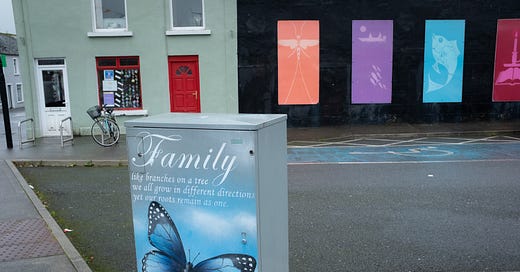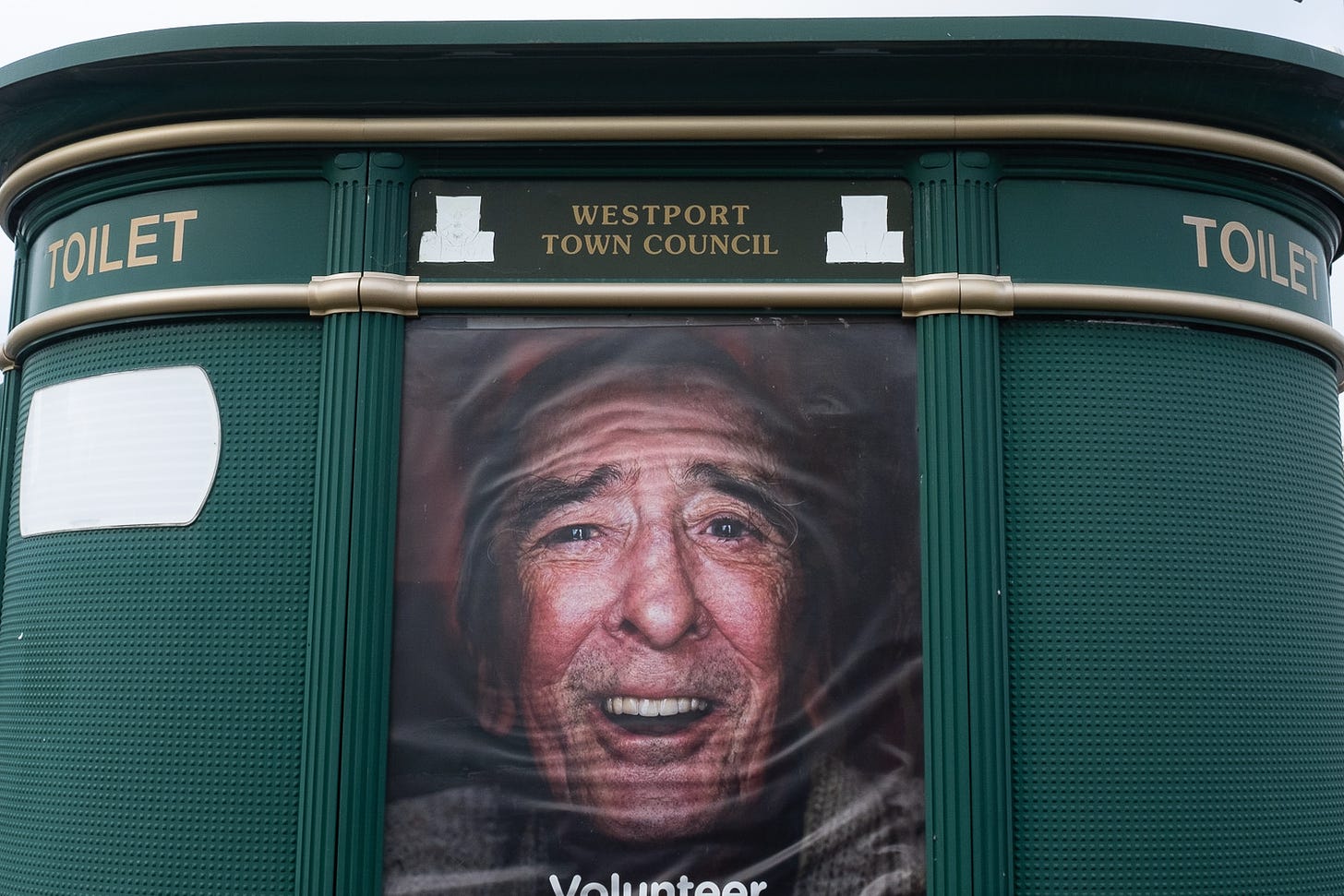It was drizzling and the distant sky wore an orange glow. I was by the junction for the road to Galway. It was only an hour away but the sun was setting. I was nervous. My previous driver had said I’d get a ride quickly, but I’d spent nearly an hour on the phone running errands and calling home. I don’t know how that affected the premonition. It had been about fifteen minutes of trying. Thumb, smile and sign. I began to think he might have been wrong.
When there was a break in the cars, I’d turn and survey the scrappy land below the road embankment, looking for a place to pitch a tent. Then I’d turn back to the road and watch the headlights growing nearer. There’d be a rush and then they’d be gone. I could walk to Ennis. The scenario ran through my mind. There was a hotel but it was over €100 a night. It would take several hours to get there and it would be dark. What’s more, I’d have to walk back to this same spot in the morning. But pitching a tent in the dark would be difficult. I’d not had dinner either and there’d be no breakfast in the morning… I looked at the map, at the motorway that ran north. It didn’t run directly to Galway, I’d have to get a second lift if I was unlucky with the first. If that was the case I’d be doing so in the dark. I’d probably be stuck… Such are the thoughts that afflict the hitchhiker as evening approaches.
When a minibus finally pulled over, relief was the main emotion. The orange indicator flared in the gloom. The windows were spotted with rain. I slid open the back door and hauled my rucksack among the seats.
I joined the driver Adam in the front. He looked placidly indifferent to my arrival. What little hair he had was white and his eyebrows were paling ginger, almost rose gold. A sprout of white curls appeared between the V in his shirt buttons.
Donegal was his destination. “People forget the northernmost point in Ireland’s not in Northern Ireland, it’s in Donegal,” he told me. He had a flat tone. It would take Adam another three hours to get there so he didn’t think he’d be home until after 10. He’d been up at 8, taking a busload of Americans down to County Clare. I forget where he said he’d dropped them.
I said I’d found it interesting how many Americans I’d met in Ireland, filling bars and buses. One might resent the fact, feeling that tourism was spoiling the place, but they were an integral part of the Irish story. Most were returning to find their roots.
In a warm, dim pub in Dingle I’d met a couple who’d been to Ireland 58 times. They were from New York State. The husband told me his family moved in 1921, “That should tell you everything you need to know,” he said, “They were wanted by the British…” The other half of his family arrived after the famine in 1853. “They survived. But there’s no record of them arriving. We can’t find anything.”
We paused our conversation as an old man sitting at a table held the room with his guitar. He sang with his eyes closed. All those around wore the downcast, contemplative stare that’s natural during the performance of a moving song. Mouths rested, eyes strained, everyone suddenly in their own world. The man sang beautifully, with a rich, gravelly voice. The final notes lingered in the thick air and everyone took a long drag of their drinks.
“Gaaad damn! That was good!” My American friend ejaculated.
As the bar cleared out I asked the old man what the song was. He was hunched over a near-empty glass in the corner and didn’t seem keen to talk. He barely looked at me as he said it was ‘A Rainy Night in Soho.’ Shane MacGowan. I’ll not forget it. I write this on the day Shane McGowan passed. He was a great man who told the stories of countless Irish emigres.
Like MacGowan, Adam had spent time in London too. He worked in Wormwood Scrubs prison, sawing steel doors off so they could merge cells. “Each cell was about as wide as this bus,” he recalled, his words were quiet and few, “But not as long. They had two beds. People were in there 23 hours a day.”
We talked about why so many people left Ireland. Adam’s answer was typically simple, “There’s nothing for them here. There are basically no people between 23 and 35 in my town. They’ve all left.” He said most go to Britain, America or Australia.
“You see Irish history is what it says on the tin,” he continued.
“Complicated?” I replied.
“No. It’s not complicated. It’s shite. That’s what it is.”
“No thanks to my English forebears.”
“No,” he looked me squarely, “It wasn’t anything to do with the English. No Englishman ever set foot in Ireland.” I went along with it, assuming he was joking. “No seriously,” he continued, his eyebrows twitching ever so slightly, “It was the French. The Brits weren’t so bad you know. For instance, they drew a line in America to protect the Indians.”
“The Proclamation Line,” I said. Oddly I’d been reading about it a few days before.
“After the Revolution, the Americans pushed through it to get the land. There were 41 million American Indians and they massacred them all. Made treaties, broke them, all that. But the Brits didn’t do that.”
I suggested he might not have been looking hard enough.
We changed the subject back to London. He hadn’t enjoyed living there much. I told him I liked it. I liked how cosmopolitan it was.
“I don’t know what that means,” he frowned, “When I was there I hardly heard an English accent.” He said something racist and aired a theory, “They get the vote and soon they’ll be the government and all the rest of it.”
“But they’re British…” I responded.
“Their religion is different and they’ll follow their religion first and foremost.”
I told him I disagreed and we both looked out of the window. It was dark by now and raining properly. The windscreen wipers were at work. “Do you have any family?” I asked.
“No not really.”
I asked about his bus instead. He’d been driving it for seven years. Now he was mostly retired so he didn’t take too many trips. His bus had done 150,000 miles though and had been modified to go no faster than 60 mph. “It can give you quite a shock if you’re not used to it,” he said, almost chuckling, “Well because it’s a public service vehicle, the law actually says it can’t go over 50mph.” The speedo flickered red in the dark. He tapped it and he turned to me, a latent look of pleasure on his face. “We’re actually breaking the law right now.”
He drove me right to Galway. I felt bad that he’d come off course to drop me and offered to pay for his trouble. He declined and said it had been on his way anyway. He was quite sure of it. I got out by a model of a soldier from the Terracotta Army and Adam drove away without much fanfare.
That night I found pub that was playing music. There was a great fiddler and the band played the Pogues. I met an American woman called Exa. She was short and wore a baker-boy hat. She told me she’d just split up with her girlfriend of 23 years. She couldn’t live with her one more day. “Nope, not a single day more,” she shook her head. “Money, religion and sex. They’re the big fishes in a relationship.”
She was in Ireland with a tour group. “I don’t have much money,” she confided, “but this came up and it was a really good deal.”
She said it was the trip of a lifetime.





